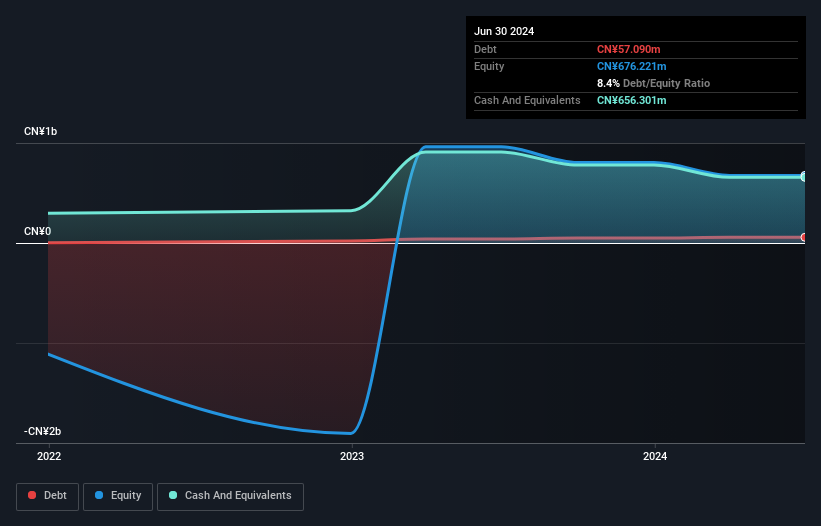
Warren Buffett famously said, 'Volatility is far from synonymous with risk.' So it seems the smart money knows that debt - which is usually involved in bankruptcies - is a very important factor, when you assess how risky a company is. As with many other companies Laekna, Inc. (HKG:2105) makes use of debt. But should shareholders be worried about its use of debt?
Why Does Debt Bring Risk?
Debt is a tool to help businesses grow, but if a business is incapable of paying off its lenders, then it exists at their mercy. Ultimately, if the company can't fulfill its legal obligations to repay debt, shareholders could walk away with nothing. However, a more common (but still painful) scenario is that it has to raise new equity capital at a low price, thus permanently diluting shareholders. Of course, the upside of debt is that it often represents cheap capital, especially when it replaces dilution in a company with the ability to reinvest at high rates of return. The first thing to do when considering how much debt a business uses is to look at its cash and debt together.
See our latest analysis for Laekna
What Is Laekna's Debt?
The image below, which you can click on for greater detail, shows that at June 2024 Laekna had debt of CN¥57.1m, up from CN¥39.8m in one year. However, its balance sheet shows it holds CN¥656.3m in cash, so it actually has CN¥599.2m net cash.

How Strong Is Laekna's Balance Sheet?
We can see from the most recent balance sheet that Laekna had liabilities of CN¥131.6m falling due within a year, and liabilities of CN¥7.69m due beyond that. On the other hand, it had cash of CN¥656.3m and CN¥1.09m worth of receivables due within a year. So it actually has CN¥518.1m more liquid assets than total liabilities.
This surplus strongly suggests that Laekna has a rock-solid balance sheet (and the debt is of no concern whatsoever). Having regard to this fact, we think its balance sheet is as strong as an ox. Simply put, the fact that Laekna has more cash than debt is arguably a good indication that it can manage its debt safely. There's no doubt that we learn most about debt from the balance sheet. But you can't view debt in total isolation; since Laekna will need earnings to service that debt. So if you're keen to discover more about its earnings, it might be worth checking out this graph of its long term earnings trend.
Given its lack of meaningful operating revenue, Laekna shareholders no doubt hope it can fund itself until it has a profitable product.
So How Risky Is Laekna?
By their very nature companies that are losing money are more risky than those with a long history of profitability. And we do note that Laekna had an earnings before interest and tax (EBIT) loss, over the last year. Indeed, in that time it burnt through CN¥285m of cash and made a loss of CN¥296m. However, it has net cash of CN¥599.2m, so it has a bit of time before it will need more capital. Even though its balance sheet seems sufficiently liquid, debt always makes us a little nervous if a company doesn't produce free cash flow regularly. There's no doubt that we learn most about debt from the balance sheet. But ultimately, every company can contain risks that exist outside of the balance sheet. For example, we've discovered 2 warning signs for Laekna (1 shouldn't be ignored!) that you should be aware of before investing here.
Of course, if you're the type of investor who prefers buying stocks without the burden of debt, then don't hesitate to discover our exclusive list of net cash growth stocks, today.
New: AI Stock Screener & Alerts
Our new AI Stock Screener scans the market every day to uncover opportunities.
• Dividend Powerhouses (3%+ Yield)
• Undervalued Small Caps with Insider Buying
• High growth Tech and AI Companies
Or build your own from over 50 metrics.
Have feedback on this article? Concerned about the content? Get in touch with us directly. Alternatively, email editorial-team (at) simplywallst.com.
This article by Simply Wall St is general in nature. We provide commentary based on historical data and analyst forecasts only using an unbiased methodology and our articles are not intended to be financial advice. It does not constitute a recommendation to buy or sell any stock, and does not take account of your objectives, or your financial situation. We aim to bring you long-term focused analysis driven by fundamental data. Note that our analysis may not factor in the latest price-sensitive company announcements or qualitative material. Simply Wall St has no position in any stocks mentioned.
About SEHK:2105
Laekna
An investing holding company, engages in the discovering, development, and commercialization of therapies for patients with cancer, metabolic diseases, and liver fibrosis worldwide.
Excellent balance sheet very low.
Market Insights
Community Narratives



